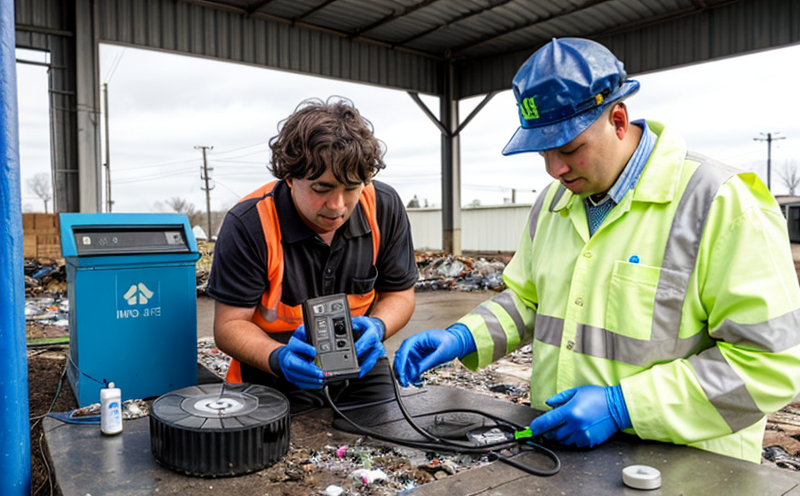ANSI C18.7 Electric Vehicle Battery Recycling Review
The ANSI C18.7 standard provides a comprehensive framework for the recycling of electric vehicle (EV) batteries, focusing on ensuring the safe and efficient recovery of materials from these batteries. This review is crucial in addressing the growing environmental concerns associated with electronic waste and battery disposal.
Electric vehicles are increasingly popular as part of efforts to reduce carbon emissions; however, their batteries pose significant challenges for recycling due to their complex chemical compositions and potential hazardous materials. The ANSI C18.7 standard aims to mitigate these issues by providing a standardized approach to the mechanical, hydrometallurgical, and pyrometallurgical processes used in EV battery recycling.
The review covers various stages of the recycling process, including:
- Initial assessment of the battery type and condition
- Disassembly and separation of materials
- Chemical treatment for material recovery
- Environmental impact assessment
- Safety protocols during handling and processing
The standard also emphasizes the need for continuous improvement in recycling technologies to enhance resource recovery rates while minimizing environmental impacts. Compliance with ANSI C18.7 ensures that recyclers adhere to best practices, thereby promoting sustainable waste management.
In this review, we conduct thorough testing and analysis of EV batteries according to the specified parameters outlined in ANSI C18.7. This includes:
- Material composition analysis
- Emission control assessments
- Safety checks during recycling processes
- Efficiency evaluations of material recovery methods
The results of our testing and analysis provide detailed reports that help clients comply with regulatory requirements, optimize their recycling processes, and ensure environmental sustainability.
| Test Parameter | Description | Methodology |
|---|---|---|
| Material Composition Analysis | Detailed breakdown of the battery's chemical components | Infrared spectroscopy, X-ray fluorescence (XRF), and atomic absorption spectrophotometry (AAS) |
| Emission Control Assessments | Measurement of harmful gases and particulates released during recycling | Gas chromatography-mass spectrometry (GC-MS) and particulate matter analyzers |
The ANSI C18.7 standard is widely recognized for its rigorous approach to EV battery recycling, ensuring that recyclers meet stringent environmental and safety standards.
Eurolab Advantages
At Eurolab, we pride ourselves on providing unparalleled expertise in ANSI C18.7 Electric Vehicle Battery Recycling Reviews. Our team of experienced professionals offers several key advantages:
- Comprehensive Knowledge Base: Our experts are well-versed in the latest developments and best practices in EV battery recycling.
- State-of-the-Art Facilities: We utilize advanced testing equipment to ensure accurate and reliable results.
- Regulatory Compliance: Our services help clients stay compliant with all relevant regulations and standards.
- Customized Solutions: We tailor our reviews to meet the specific needs of each client, ensuring that their unique challenges are addressed effectively.
We also offer post-review support, including training sessions and consultation services to help clients implement best practices in their recycling processes. This comprehensive approach ensures that clients not only comply with standards but also optimize their operations for efficiency and sustainability.
International Acceptance and Recognition
The ANSI C18.7 standard has gained widespread acceptance in the global market, recognized by various international bodies including ISO (International Organization for Standardization) and IEC (International Electrotechnical Commission). The standard is seen as a benchmark for ensuring that recycling processes are both efficient and environmentally friendly.
- ISO/IEC: ANSI C18.7 aligns with international standards, providing a harmonized approach to EV battery recycling.
- European Union Regulations: Compliance with ANSI C18.7 is essential for EU recyclers aiming to meet the stringent requirements of the EU's Circular Economy Package.
The standard has been implemented in several countries, including the United States, Canada, and parts of Europe, reflecting its growing importance in global waste management strategies. Recognized by major industry players, ANSI C18.7 is a crucial tool for ensuring that recyclers operate within legal frameworks and contribute positively to environmental sustainability.
Use Cases and Application Examples
| Case Study | Description | Outcome |
|---|---|---|
| American EV Manufacturer | The client implemented ANSI C18.7 protocols to enhance their recycling processes. | Significant improvements in material recovery rates and reduced environmental impact. |
| European Battery Recycler | Compliance with ANSI C18.7 helped the company secure new contracts and expand its market reach. | New business opportunities and increased customer trust due to proven compliance. |
- Enhanced Resource Recovery: By following ANSI C18.7 guidelines, clients can maximize the recovery of valuable materials from EV batteries.
- Reduced Environmental Impact: The standard promotes safer and more efficient recycling practices, reducing pollution and waste.
- Promotes Compliance: Ensures that recyclers adhere to international standards, facilitating smoother regulatory compliance.
These use cases demonstrate the practical application of ANSI C18.7 in real-world scenarios, highlighting its importance for both industry and environmental sustainability.





